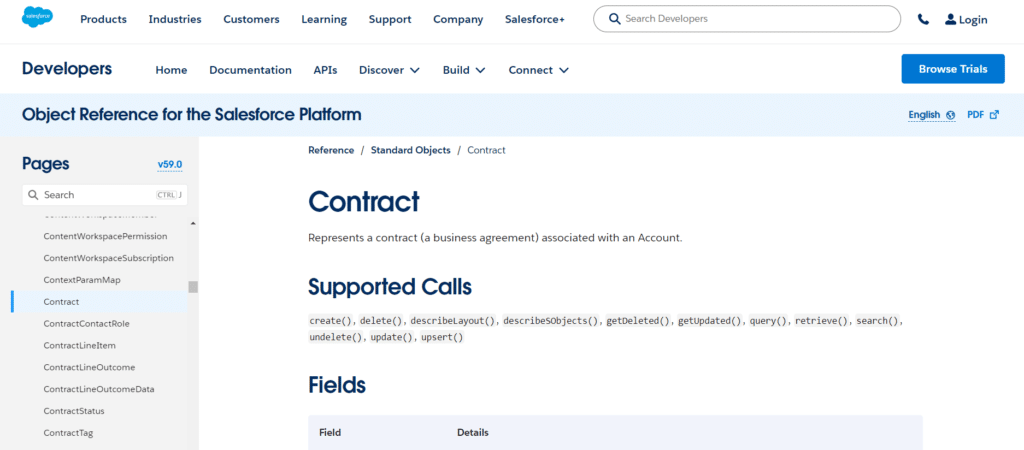Salesforce Contract Object: Managing contracts is a crucial component of customer relationship management (CRM) that directly impacts a company’s ability to succeed. Leading CRM platform Salesforce recognizes the value of efficient contract management and offers a particular Salesforce Contract Object to consolidate and simplify this vital part of company operations. In this blog post, we will examine the features, advantages, and ways that companies may use the Salesforce Contract Object to improve their contract management procedures.

Understanding the Contract Object in Salesforce: One powerful tool that makes managing business agreements in the Salesforce platform more accessible is the Salesforce Contract Object. It offers a centralized, organized framework for monitoring, evaluating, and working together on contracts; this increases visibility, minimizes manual labour, and guarantees adherence to contractual duties.
Table of Contents
ToggleSalesforce Contracts
Customers can oversee the whole lifecycle of a contract with Salesforce Contracts. Control the contract lifecycle, which begins with contract authoring and ends with contract activation and the integration of the sales process. See the Salesforce Contracts Developer Guide for details on Apex references, Salesforce Contracts standard objects, APIs, and Metadata API types.

Release Notes for Salesforce Contracts: Customers can manage the entire end-to-end lifetime of contracts with Salesforce Contracts. Opportunities, orders, quotes, custom objects, and standard Salesforce objects can all be linked to contracts.
Overview of Salesforce Contracts: Customers can manage the entire end-to-end lifetime of contracts with Salesforce Contracts. Opportunities, orders, quotes, custom objects, and standard Salesforce objects can all be linked to contracts.
Salesforce End-to-End Process Contracts: With its many configurable options, Salesforce Contracts automates and simplifies each step of the contractual process.
Steps to Follow After Installing Salesforce Contracts for Winter ’23 and Upward Releases: For the Salesforce Contracts functionality to be available, you must finish the org setup and post-installation procedures after enabling the ContractManagement license in your organization.
Update to the Most Recent Version of Salesforce Contracts: Most of the time, updating to the most recent version of the Salesforce Contracts application can be done without any action on your part.
Managing Systems and Configuring Salesforce Contracts: Depending on how you use Salesforce Contracts, you may need to do additional steps after installation, such as user licensing, contract state model and transition settings, e-signature configuration, and configuration of core features.
Salesforce Agreements APIs: The Salesforce Contracts application uses Connect APIs.
Make use of Salesforce Contracts Application Contracts could go through several revision cycles: A new version is recorded after every modification. Procedures can be carried out on revisions of the contract documents.
Limitations on Salesforce Contract Objects
Although a standard contract object is bundled in most Salesforce editions, its out-of-the-box functionality is restricted. Finance and legal are essentially left on their own when establishing the physical contract itself, even though the contract object helps track details like a contract’s account, status, term, and billing information.
If businesses choose to generate contracts outside of Salesforce manually, there is a great deal of possibility for error due to this limited functionality. Among the following outcomes of this manual workflow are possible:
- Using outdated or incorrect information
- Time lost as a result of ineffective revision procedures
- Decreased safety and adherence to corporate guidelines
- Inconsistent language and branding
Any financial or legal department utilizing Salesforce shouldn’t continue to risk losing deals and dragging down the contract life cycle by generating their contracts manually, especially with so much margin for mistake.
Fortunately, by lowering and even eliminating these errors and pain spots, there are solutions on the Salesforce AppExchange that may greatly simplify the contract development process in Salesforce. Document generation solutions are what these are known as.
Advanced Features of Contract Objects in Salesforce

Contract Templates and Clause Library: Salesforce streamlines the contract development process by enabling firms to generate standardized templates.
Contractual frequently used clauses can be saved and reused with the help of a clause library, guaranteeing consistency and lowering the possibility of linguistic errors.
Revenue Recognition: The Salesforce Contract Object interfaces with Salesforce Revenue Cloud to provide robust revenue recognition features for companies with subscription-based or recurring revenue models.
Accurate revenue forecasting, adherence to accounting rules, and a comprehensive understanding of the financial impact of contracts are all ensured by this integration.
KPIs, key performance indicators, and contract metrics: Companies can monitor particular KPIs and metrics by adding custom fields and algorithms to the Contract Object.
Contract Value, Contract Duration, and Customer Satisfaction Ratings are a few examples that offer practical insights into how well a contract is performing.
Globalization and Support for Multiple Currencies: Salesforce Contract Object offers multi-currency capabilities for enterprises with global operations.
This feature makes managing multinational contracts easier by ensuring that contract values and financial information are appropriately reflected in each business unit’s local currency.
In Conclusion
The Salesforce Contract Object is a critical component of contemporary contract administration thanks to its cutting-edge capabilities, flexible use cases, and best practices. Businesses can use its features to reduce risks, acquire meaningful insights, strengthen connections with vendors, customers, and partners, and streamline contract processes.
The Salesforce Contract Object is still a vital tool for handling the complexity of today’s business environment as long as companies prioritize efficiency and compliance in their operations.




